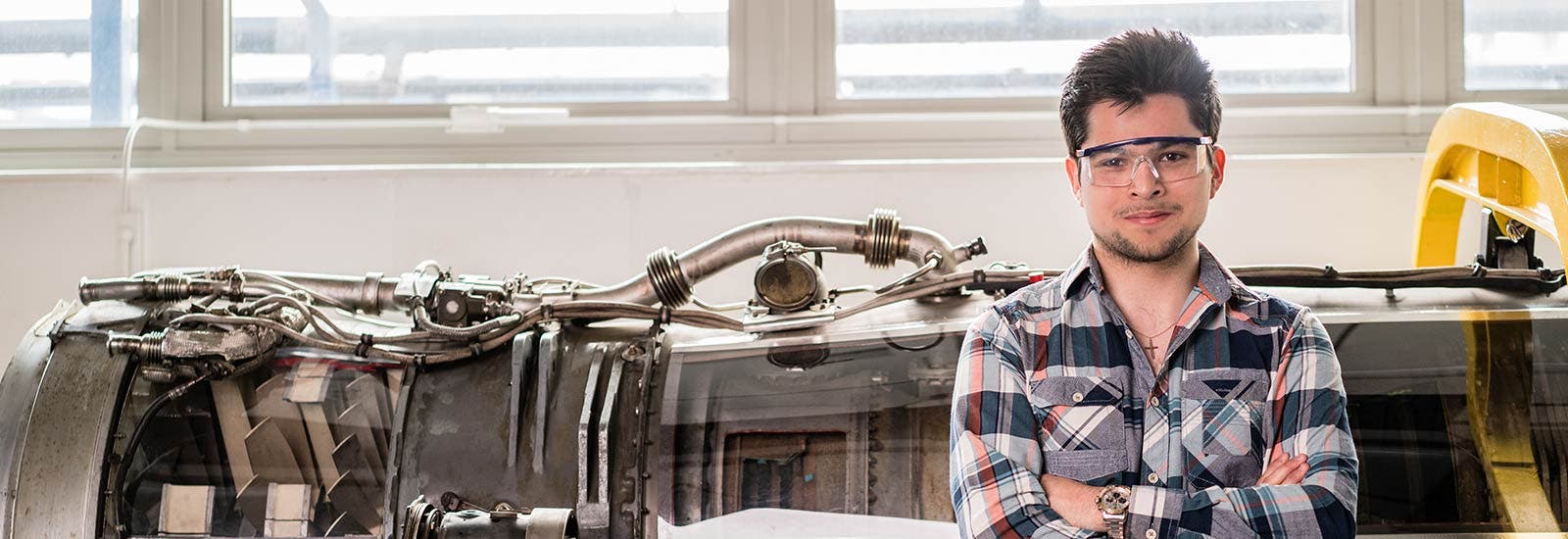Computing, Engineering and Physical Sciences International Foundation Year
About this route
The Computing, Engineering and Physical Sciences International Foundation Year leads to a wide range of degrees in computing, engineering, science and mathematics-related subjects at the University of Surrey.
During the International Foundation Year you will study a core unit of general subject skills, subject-specific units and elective units, which are carefully designed for your academic development.
If you need to improve your English language to reach the required level for your International Foundation Year, you can take our Online English Language Preparation programme.
The Academic English Skills course teaches students the specific academic language skills they need to develop for success at the University of Surrey. The course focuses on the receptive (listening and reading) and productive (speaking and writing) skills through practice in semi and authentic task-based activities which build a strong foundation in preparation for each student's future studies. This critical module places particular emphasis on developing academic reading and research skills; research-based writing along with presentation and seminar speaking skills.
Modules
Mathematics
The module is designed to provide a strong foundation in mathematical modelling and core mathematics skills required for courses in Engineering, Computing and other STEM subjects. Its overall aim is to develop the academic language, subject-specific knowledge, academic study skills, and cultural awareness of international students from a wide range of countries and educational systems. This will enable them to progress confidently onto their chosen undergraduate programme with the appropriate subject background skills. The module also aims to foster an interest in mathematics and its applications, while enhancing students' self-confidence, initiative-taking, and independent working skills.
Computer Science*
This module introduces the essential principles and concepts of computer science to students with diverse backgrounds, aiming to prepare them for further undergraduate studies in this field. By engaging with this module, students will cultivate their computational thinking abilities, which will enable them to approach real-world systems and their own creations with creative, analytical, and logical perspectives. Moreover, students will acquire foundational programming skills and will create a programme, applying the principles, techniques, and methodologies learned throughout the module in a practical context.
Physics*
This module provides international students with a comprehensive introduction to the fundamental concepts of physics. Through a combination of seminars, experiments, and discussions, students will gain a deep understanding of physics and develop the skills they need to succeed in further study and careers in science and engineering. Topics covered include waves, materials, mechanics, fluids, electrical circuits, and atomic physics. Students will learn about the fundamental laws of physics and how these can be applied to the real-world scenarios. Students also enhance their English language skills through academic writing and discussions. This module prepares international students for further studies and careers in science and engineering.
Chemistry*
This module is a comprehensive course that establishes a strong foundation in chemistry principles. The module covers fundamental topics in atomic structure, chemical bonding, reactions, and thermodynamics. Through hands-on laboratory experiments and analytical problem-solving exercises, students gain a deep understanding of chemistry. This module is a cornerstone for students' future studies in chemistry, as it provides them with the skills and knowledge necessary to succeed in both academic and professional settings. Chemists are in high demand in a variety of fields, including medicine, materials science, and environmental science. The Chemistry module equips students with the skills they need to contribute to these and other important fields.
Project Skills for STEM
This module is designed to help students enhance their understanding of statistics and apply this knowledge to address complex sustainability challenges (wicked problems) within the fields of STEM. By incorporating sustainability into the module, students will learn how to utilise their statistical expertise and develop investigative project skills to tackle real-world problems.
This module is divided into two phases. In the first phase, students will utilise statistical methods to solve intricate (wicked) problems specific to their respective areas within STEM and guided by the United Nation's Education for Sustainable Development (ESD) goals. This will aid in the development of their disciplinary expertise and foster an appreciation for diverse perspectives. In the second phase, students will engage in an investigative project, collaborating, if possible, within multidisciplinary teams to explore and resolve sustainability challenges. This phase will enable them to apply not only statistical methods, but also knowledge and skills acquired across other subject modules within this programme. Through this interdisciplinary approach, they will further enhance their analytical, problem-solving, and investigative capabilities by engaging with real-word, cross-cutting sustainable challenges, aligning with ESD goals.
* Depending on the progression degree, students will study either Computer Science, Physics or Chemistry.
Study plans
September intake
January intake
Rankings
13th in the World and 3rd in the UK for Engineering – Petroleum
(QS World University Rankings by Subject 2025)
10th in the UK for Aerospace Engineering
(The Guardian University Guide 2026)
Key facts
Course length:
Two semesters
Entry points:
September, November (Enhanced Induction) and February
Age: you must be at least 17 years old to study at the International Study Centre and progress to the University.
Visit our entry requirements page for a list of academic, English language and country/region-specific entry requirements.
Student success
Progression degrees
This programme can lead to one of the undergraduate degrees in the table below. Grades and progression degrees are guidelines and subject to change. All degrees listed include the option to undertake the Professional Training Year programme in year two of a four year degree.
Please note, for English grades: W stands for Writing, R is Reading, L is Listening and S is Speaking
| Degree Programme Name | Award | Overall Grade | English Grade |
|---|---|---|---|
| No Results | |||
Please note:
Additional entry criteria may be required as well as an interview with the Department for progression to Film Production and Broadcast Engineering.
Prepare for Success
Join our online preparation course at no extra cost, so that you are ready to thrive academically and culturally in your new environment.
Discover more